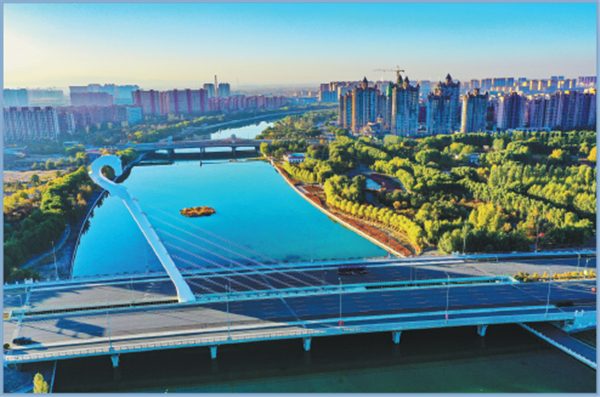Guarding green takes center stage
Editor's note: This year, the Communist Party of China is celebrating the 100th anniversary of its founding. China Daily is publishing a series of stories looking at the tremendous changes that have occurred in provinces, autonomous regions and municipalities under the leadership of the Party. They also include stories of the people and places that have left indelible marks in the Party's path to glory.

The Tselgertal Bridge in Hohhot, Inner Mongolia autonomous region, in October. Its shape resembles a morin khuur, or horsehead fiddle, a traditional Mongolian stringed instrument. LE YAN/FOR CHINA DAILY
The Inner Mongolia autonomous region will make ecosystem protection the priority while maintaining high-quality development, said Shi Taifeng, secretary of the region's Party committee.
As China embarks on its new journey toward socialist modernization, the region will strive to become an important base for national energy and strategic resources as well as agricultural and livestock production, he added.
Shi stressed that environmental protection will always be the priority while cultivating high-quality development. The region will adjust and optimize land space, industry layout, the local economy and urban and rural construction to make sure that all areas and industries are efficiently built using low-carbon resources.
The protection of grassland and forests, which make up the majority of the region, is the primary task. In order to enhance the quality and stability of the local ecosystem, the region will improve overall management of mountains, forests, lakes, grassland and sandy areas, make greater investments in research and development and use science and technology innovation as strategic support.
The region's industry is traditionally characterized by agriculture and animal husbandry but also enjoys advantages in developing tourism, new energy and new materials. As part of the plan to modernize the industrial system, the region will upgrade the industrial chain, advance the service level and build a number of belt zones and clusters that can intensively produce local special agricultural and livestock products.
To deepen reform and opening-up, Inner Mongolia will also optimize the business environment based on the rule of law, internationalization and facilitation by rooting out corruption and plugging loopholes in market supervision.
The government will also improve the allocation of land, labor, capital, technology and data, and push forward reform in finance, State-owned enterprises and rural pastoral areas to "achieve a better combination of active market and effective government and a deeper integration of reform and development", he said.
The autonomous region will also actively serve and engage in the Belt and Road Initiative by optimizing the resources in port areas, improving connectivity among land, sea and air transport channels and building important hub cities, cargo distribution centers and industrial parks.
"All the development is fundamentally centered on improving people's quality of life and achieving the goal of common prosperity," Shi said.
Compared with other provincial-level regions, Inner Mongolia has a relatively vast area with a small population, and resources are sparsely distributed, so the region needs to boost infrastructure construction and facilitate public services, he said.
With the region now lifted out of poverty, it will foster a smooth transition from poverty alleviation to rural vitalization and focus on making progress in education, healthcare, labor, housing and support for the weak and the elderly so that members of the public can benefit more from the fruits of development.
Inner Mongolia will also improve its governance system by regularly cracking down on gangsters and other criminal activities, building a more open and shared service platform and enhancing cooperation with police and the military for border defense to make sure that people live and work in peace, stability and happiness, he added.
As a region with a sizable population of ethnic groups, Inner Mongolia has also designated safeguarding ethnic unity as an important task. Shi said the main aim is to consolidate a sense of belonging in the regional community.
The region has already enjoyed a high degree of autonomy in handling ethnic matters, but to protect the fundamental interests of all ethnic groups and achieve the ultimate goal of common prosperity, Shi said there are still gaps that need to be filled.
The region will need to continue narrowing the divide in income between urban and rural areas. Strategies include promoting high-quality economic and social development in areas featuring ethnic groups, developing pillar industries that fit local characteristics and laying out a scientific allocation of basic public services.
"We always adhere to governing ethnic affairs in accordance with the law, and we will continue to improve laws and regulations to safeguard ethnic unity," he added.
This year marks the centenary of the establishment of the Communist Party of China. As secretary of Inner Mongolia's Party Committee, Shi said the strict governance of the Party will be upheld.
The regional Party will conduct in-depth education on Party history to inherit the "red" spirit endowed by members over the decades with persistence and resilience, he said.
Shi added the tough line on Party discipline will be maintained, and the Party will always have a zero-tolerance stance toward corruption.
"We will make sure that Party members dare not, cannot and will not be corrupt. We will systematically and fundamentally purify the political environment, and we will inspire Party units and cadres at all levels to assume their responsibilities, bear in mind the original aspiration of the Party and unite and lead people of all ethnic groups to forge ahead on a new journey," he said.



 Print
Print Mail
Mail


